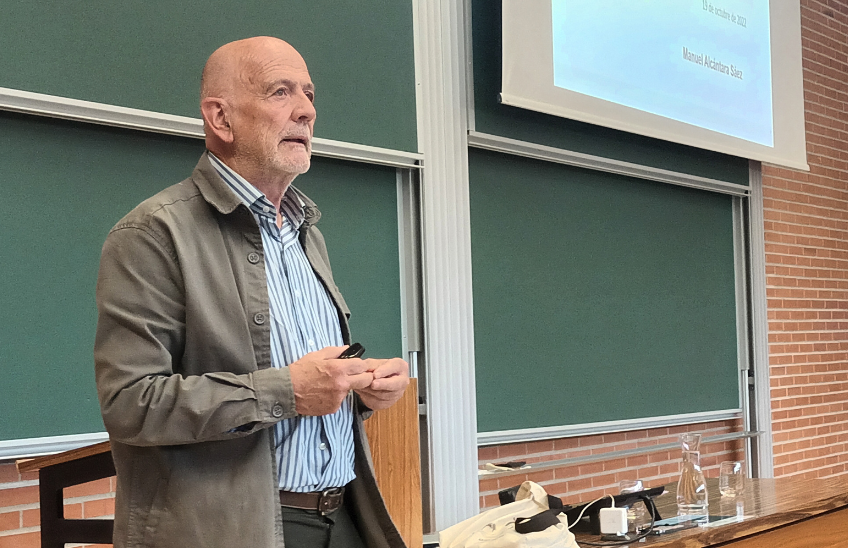Manuel Alcántara, political scientist: "Inequality has always been the main problem in Latin America but now there is a self-awareness of it".
The Full Professor of the University of Salamanca spoke of "fatigued democracies" in a session at the Latin America Summit organized by the University's School of Law.

FotoIR/ManuelAlcántara, during the lecture he gave at the School de Derecho.
20 | 10 | 2022
What is happening in Latin America and are we facing a new political cycle, with an exhausted presidentialism and volatile political parties without identity in the different countries? The political scientist and Full Professor of the University of Salamanca, Manuel Alcántara addressed some of the key issues that will mark the future of democracies in Latin America. It was in a new session of the Latin America Summit organized from the School of Law of the University of Navarra and with a lecture that carried by degree scroll: Fatigued Democracies in Latin America. "Inequality has always been the main problem in Latin America but now there is a self-awareness of it. There has been an impact on expectations: 'my children are not going to live better than me,'" he said.
Alcántara wanted to show with figures and graphs this 'democratic fatigue' and presented the students with some conclusions: "In ten years, the confidence of Latin American citizens in democracy as a political system has fallen 10 points. And, according to the latest Latinobarómetro data , in 2010, 63% of citizens preferred democracy to any other form of government. In 2020, citizens advocating that option accounted for 49%," he said.
Alcántara cited Bauman's theory of the 'liquid society' and highlighted "the brutal change" that is taking place in all regions, with what he called the "digital explosion". He highlighted the popular unease towards politics, which is manifested in three main issues: distrust in institutions, the loss of value of democracy and the increasing visibility of corruption rates, the result, on the other hand, of more open societies.
Alcántara then exposed some features that define Latin American systems such as volatility in the electorate, the increase of issue of parties and the leave identification of citizens with a particular party. "I wanted to clarify that Latin America is not a hegemonic region. It is more complex and diverse than Europe, but if there is one feature that defines all Latin American countries it is that they are all presidentialist", he said and then introduced five issues that, in his opinion, will determine the political diary in Latin America in the coming years. A new cycle that begins marked by several milestones such as the cancellation of the elections in Bolivia in 2019, the pandemic and the socio-cultural and economic changes in a society marked by the value given to data, what Alcántara called dataism.
Alcántara spoke of a presidentialism submitted to test, once again, with presidents without a majority in the congresses and "stormy" relations between the Executive and the Legislative. "Political parties in Latin America have been transformed. It is necessary to rethink the political parties that lack clear signs of identity and are mere applauders of the leader," he added. The third question is to know if there will be a bequest as a result of the Chilean constitutional plebiscite and the lessons of the process itself: mobilization-participation-representation; two other keys to take into account are the adaptation of politics to the digital and globalization.


